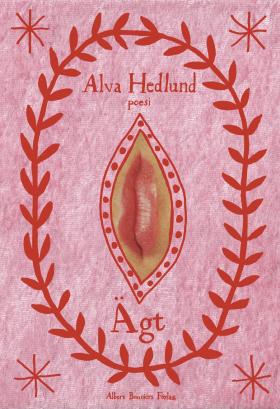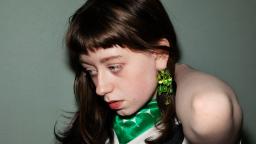
Ägt
(Owned)
by Alva Hedlund
reviewed by Faith Manalili
The 20-year-old poet and literary critic Alva Hedlund has been active in the Swedish poetry scene for some time, regularly performing readings and featuring in literary events. She recently debuted with her work Ägt (Owned), which is an intimate and sharp exploration of the inextricability of the self and others. In short, sometimes even one or two-line stanzas on each page that form a continuous poem, the speaker obliquely considers their relationship to an unnamed ‘you’ and to themselves.
The book opens with the line ‘you are not here / to sleep’. It immediately sets the tone: the reader can infer that this is an intimate relationship. It is one so close that it ‘can’t be chopped’, and the intensity is such that it leaves scratches and claw marks. The work also engages with emotions wrought by this closeness, such as insecurity and doubt. The speaker asks questions such as, ‘have you tried? // getting out?’ and ‘have you been mad at me / because i’ve wanted to own you?’. As the title suggests, Ägt centres around obsession and possession. I get the feeling that it is partly about how we consume each other.
With Hedlund’s autopsy of this relationship, I’m reminded of Margaret Atwood’s collection Power Politics: Poems (1971), which shares some themes and the sensory style of writing. In one of the poems, Atwood writes: ‘you fit into me / like a hook into an eye // a fish hook / an open eye.’ This dichotomy of tenderness and violence runs throughout Ägt. There’s softness and malleability, but also incisive verbs like ‘cut’, ‘crumple’, and ‘scrape’.
In her essay Eros the Bittersweet (1986), Anne Carson draws upon Ancient Greek literature to discuss desire. She identifies a gap, or a ‘hole’, that occurs between a person and their object of desire: ‘[w]hen I desire you, a part of me is gone: my want of you partakes of me’. While not sharing the exact same view, it seems that Hedlund implicitly explores what happens to one’s personal identity in a relationship. The obsession and control are also directed inwards. It feels natural, then, that the body and eating are recurrent themes in the book. ‘[I] don’t want to love you / i want to eat’, she writes. Similarly, the book also seems to touch on self-image. It is reflected in the epigraph, which comes from a song titled ‘Faceshopping’ by the British hyperpop musician SOPHIE:
Artificial bloom
Hydroponic skin
Chemical release
Synthesise the real.
Despite the pared-back and fragmentary form, this book is a work that holds a lot. There are some interesting references, repetition, and fun wordplay that I find myself poring over again, only to discover something new each time. And Hedlund delves deep, quite literally. There’s a tableau of corporeal and gritty details: sediment, particles, soil, bacteria, infections, brain matter, and skin. With such a precise language and zoomed-in imagery, she deftly manages to create a claustrophobic atmosphere. Some lines are so relatable that I feel like I’m in the mind of the speaker at times, and at other times I feel like we’re having a quiet conversation together in a cramped room.
Hedlund writes, with a self-assured voice, about interconnectedness and its parameters. She gazes inwards and outwards, and appears to indirectly ask questions such as: How much of you belongs to me? Where do I end and where do you begin (yes, akin to the famous Radiohead lyric)? Yet, it never strikes me as maudlin despite the focus on relationships. Ägt is a polished, absorbing, and visceral work that will stay on my mind for a long time. A poem that just swallows you up.

Ägt
Albert Bonniers Förlag, 2025,85 pages
Foreign rights: Hanna Bäärnhielm Thorslund, Bonniers
Alva Hedlund is a poet and literary critic who lives in Stockholm. Ägt is her debut.
